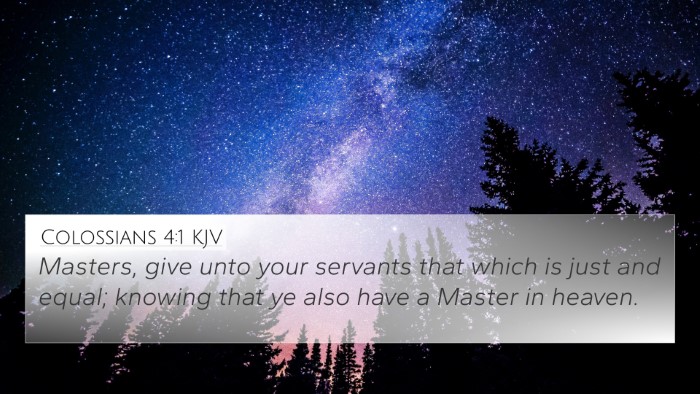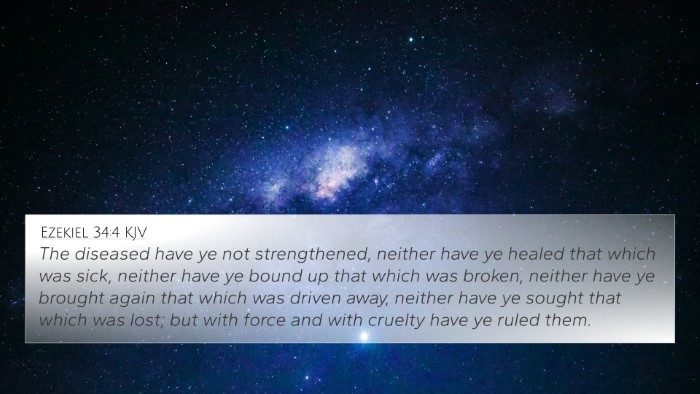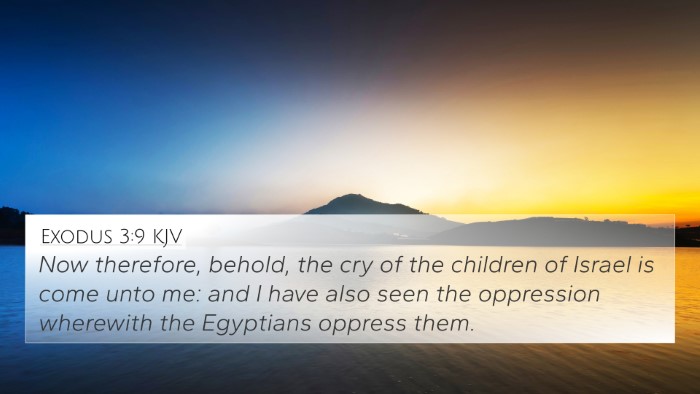Understanding Leviticus 25:43
Leviticus 25:43 states, "Thou shalt not rule over him with rigour; but shalt fear thy God." This verse is a part of the larger context regarding the treatment of bondmen and servants among the Israelites. Here, it emphasizes the principles of compassion and respect for human dignity, especially among the vulnerable in society.
Summary of Insights
The interpretations provided by known commentators, including Matthew Henry, Albert Barnes, and Adam Clarke, highlight several key themes:
- Respect for Servants: The necessity of treating servants with kindness is underscored. God demands that owners treat their servants not harshly but as fellow human beings to be respected.
- Fear of God: The phrase "but shalt fear thy God" indicates that the fear of God should guide how masters conduct themselves. A divine quality of justice should define their actions.
- Moral Responsibility: The verse reflects a moral responsibility that transcends mere legal obligations. It calls for a heartfelt acknowledgment of God’s sovereignty, inspiring owners to act with benevolence.
- Legal Context: This verse appears within the context of the laws in Leviticus which aimed to create a just society among the Israelites. Instruments such as the Year of Jubilee played a significant role in restoring rights and land to its original owners.
Commentary Insights
Matthew Henry:
Matthew Henry emphasizes the disparity in power dynamics between masters and servants. He stresses that while masters hold authority, they are nonetheless accountable to God for their treatment of those under their care. The essence of this treatment reflects the ultimate accountability to divine justice.
Albert Barnes:
Albert Barnes highlights that the prohibition of rigor indicates that, under God's law, kindness should be the standard, and the master should treat his servants as he would wish to be treated—calling to mind the golden rule found in later teachings.
Adam Clarke:
Adam Clarke expands on the concept of servitude in ancient Israel, recognizing it as both a social and economic necessity within the community. Clarke notes that this law institutes a system of safeguards and compassion for those in servitude, reflecting God's care for all His people.
Bible Verse Cross-References
To better understand Leviticus 25:43, we can look at several related Bible verses that enhance its meaning:
- Exodus 21:20-21 - Discusses the treatment of servants and the consequences of abuse.
- Deuteronomy 15:12-15 - Advocates for the release of Hebrew servants after six years of service.
- Ephesians 6:9 - Encourages masters to treat their servants well, recognizing their common humanity.
- Colossians 4:1 - Similar to Ephesians, it advises fairness and just treatment in the master-servant relationship.
- Leviticus 19:13 - Addresses the importance of honesty and fairness in dealing, with implications for the treatment of workers.
- Matthew 7:12 - The principle of treating others as one wishes to be treated, applicable in all relationships.
- Romans 12:10 - Speaks to mutual respect and honor among believers, which could extend to the master-servant dynamic.
Thematic Bible Verse Connections
Leviticus 25:43 connects with broader biblical themes of:
- Justice and Mercy: The Bible consistently teaches about the balance between justice and mercy—principles rooted deeply in God's character.
- Social Justice: The treatment of the marginalized is a recurring theme in biblical texts, reminding believers of the importance of equity.
- Community and Well-Being: Building a healthy community includes ensuring the dignity and fair treatment of all members.
- Sovereignty of God: The fear of God serves as a reminder of His ultimate authority, which should guide human interactions.
Conclusion
Leviticus 25:43 is not merely an ancient law but a timeless exhortation that extends into the heart of Christian ethics. The connections made with other scriptures enrich our understanding of the importance of compassion and stewardship. Engaging with the biblical text through cross-referencing provides greater insight into the intricate web of God's guidance for human conduct.



















